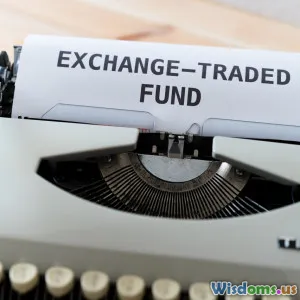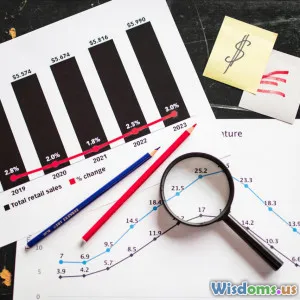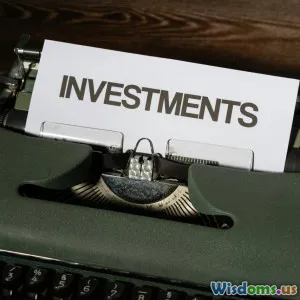
Will Thematic ETFs Shape the Future of Sustainable Investing
8 min read Explore how thematic ETFs are revolutionizing sustainable investing by aligning financial performance with environmental and social impact. (0 Reviews)
Will Thematic ETFs Shape the Future of Sustainable Investing?
Sustainable investing is no longer just a niche within finance; it’s rapidly becoming a dominant force influencing how capital is deployed across the globe. Among the many tools facilitating this transition, thematic Exchange-Traded Funds (ETFs) stand out as innovative vehicles that marry financial ambitions with environmental and social impact. But will these thematic ETFs truly shape the future of sustainable investing, or are they just another trend?
This article explores the evolving landscape of thematic ETFs, their influence on sustainable investment strategies, and what their growth means for investors, corporations, and the planet.
Understanding Thematic ETFs in the Context of Sustainability
What Are Thematic ETFs?
Thematic ETFs focus on specific investment themes or trends instead of broad sectors or regions. For example, rather than investing in the entire technology sector, a thematic ETF might concentrate on cybersecurity, renewable energy, or companies with strong climate innovation credentials.
When aligned with sustainability, thematic ETFs aim to capture growth in areas linked to Environmental, Social, and Governance (ESG) principles — like clean energy, water stewardship, waste management, gender equality, and more.
Growth Trajectory of Thematic ETFs
Thematic ETFs have surged in popularity. According to Morningstar, global assets in thematic ETFs hit a record $73 billion in 2022, growing over 30% year-over-year, with sustainable themes being a significant contributor.
This growth aligns with increased investor appetite for responsible investment options. PwC reports that 77% of asset owners surveyed considered ESG factors when choosing investments in 2023, emphasizing thematic ETFs as a transparent means to meet those goals.
The Impact of Thematic ETFs on Sustainable Investing
Making Sustainability Tangible and Investable
One hallmark advantage of thematic ETFs is their ability to make abstract concepts concrete. Instead of vague ESG labels, investors can directly target sectors like solar energy or affordable healthcare, linking investments to visible environmental or social outcomes.
For instance, the iShares Global Clean Energy ETF (ICLN) offers exposure to global companies advancing renewable energy — helping investors fund solutions combating climate change.
Aligning Capital with Innovation
Thematic ETFs spotlight emerging technologies and innovative companies pushing the sustainability envelope. This ranges from companies embracing circular economy models to those pioneering sustainable agriculture or decarbonization technologies.
Funds such as the KraneShares MSCI China Environment Index ETF (KGRN) reflect growing investor interest in clean economy opportunities within key markets like China.
Influencing Corporate Behavior through Capital Flows
By channeling capital to thematic sustainable sectors, ETFs can encourage corporate shifts toward greener practices. As fund inflows grow, companies see financial incentives to enhance emissions reductions, improve labor standards, or increase transparency.
BlackRock CEO Larry Fink emphasizes, “Capital allocations drive real-world outcomes.” Therefore, thematic ETFs serve as a bridge aligning capital markets with sustainability imperatives.
Democratizing Access to Sustainable Investment
ETFs trade on public exchanges with relatively low costs compared to mutual funds, allowing more individuals to participate in sustainable investing. The low barriers increase ESG exposure beyond institutional investors to retail markets.
According to Investment Company Institute data, over 50% of ETF investors incorporate thematic sustainability in their portfolios in 2023.
Challenges and Criticisms Facing Thematic Sustainable ETFs
Defining Clear Criteria for Sustainability
Not all thematic ETFs are created equal — some suffer from vague definitions or greenwashing concerns. For example, a so-called “clean tech” ETF might include companies with controversial practices casting doubt on sustainability claims.
Therefore, rigorous ESG screening is essential. Providers like MSCI and Sustainalytics offer frameworks, but inconsistencies remain, causing investor confusion.
Concentration Risks and Volatility
Focus on niche themes entails sector or company concentration, exposing investors to heightened risk if the theme underperforms. Renewable energy themes, for instance, have experienced volatility linked to policy shifts or commodity prices.
Balancing exposure and diversification remains a challenge.
Performance Versus Impact Trade-offs
Some investors worry that thematically focused investments may sacrifice financial returns in favor of impact, or vice versa. While some thematic ETFs have delivered competitive returns, performance varies by theme and market cycle.
Continuous evaluation of both financial and impact metrics is critical.
Looking Ahead: Will Thematic ETFs Dominate the Sustainable Investing Landscape?
Increasing Customization and Innovation
The thematic ETF space is evolving with more specialized funds targeting granular sustainability themes like ESG data analytics, net-zero transition, or diversity and inclusion.
Robo-advisors and digital wealth platforms are integrating these ETFs to customize portfolios aligned with investor values.
Regulatory Support and Transparency Enhancements
Governments and regulatory bodies worldwide are standardizing ESG disclosures (e.g., EU’s Sustainable Finance Disclosure Regulation). This will aid thematic ETF providers in improving transparency and investor trust.
Greater Integration with Impact Measurement
Future thematic ETFs are likely to incorporate standardized impact metrics alongside financial performance, allowing investors to quantify both returns and real-world outcomes.
Cultivating Long-Term Capital for Sustainability
As thematic ETFs mature, they could channel vast pools of capital into long-term sustainable projects — from green infrastructure to innovative climate solutions — becoming powerful drivers of systemic change.
Conclusion
Thematic ETFs present a promising evolution in sustainable investing by transforming broad ESG aspirations into concrete, investable themes. They democratize access, enhance transparency, and funnel capital toward impactful sectors driving sustainability solutions.
While challenges like measurement clarity and concentration risks exist, ongoing innovation, stricter regulation, and surging investor interest bode well for their expanding role.
As capital markets continue aligning with sustainability imperatives, thematic ETFs are set to be key architects shaping the future landscape — where financial return and planetary stewardship go hand in hand.
Investors, advisors, and policymakers should embrace thematic ETFs as critical tools, wielding their influence mindfully to build more sustainable and prosperous futures.
Author’s Note: This article is intended to offer educational insights on thematic ETFs and sustainable investing and should not be considered as financial advice. Always consult a qualified financial professional before making investment decisions.
Rate the Post
User Reviews
Popular Posts




















